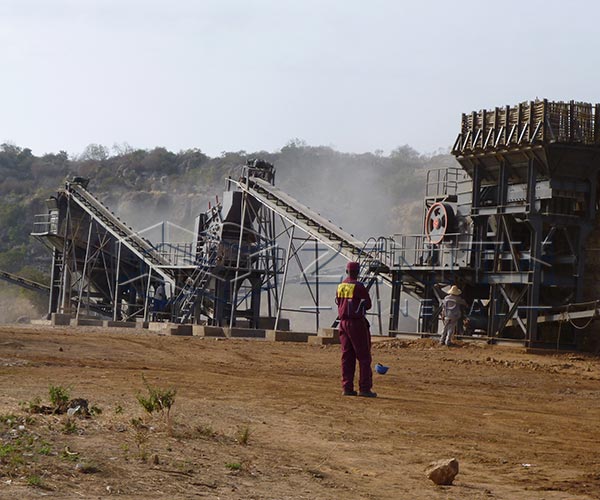
Ethiopia’s booming construction and mining sectors have driven significant demand for stone crushers, critical for producing aggregates used in infrastructure projects. With rapid urbanization and government-led initiatives like condominium housing, the need for efficient crushing equipment has surged.
Ethiopia’s mining and quarrying sectors are expanding, fueled by infrastructure development in cities like Addis Ababa, Bahir Dar, and Dire Dawa. Stone crushers process materials like basalt, granite, and limestone, essential for construction aggregates. The 200t/h basalt crushing plants are particularly common due to the material’s prevalence and moderate hardness.
Crushers in Ethiopia include jaw, cone, impact, and gyratory models. Jaw crushers handle primary crushing, while cone and impact crushers are used for secondary and tertiary stages. Mobile crushers are gaining popularity for their flexibility, while stationary units suit high-volume, fixed-site operations.
Manufacturers like Zenith, and Henan Liming offer a range of crushers tailored to Ethiopia’s needs. These companies provide technical support, spare parts, and training to ensure operational efficiency.
Mobile stone crushers in Ethiopia typically range from USD 120,000 to USD 550,000, depending on capacity (50–200 tph), type (jaw, cone, or impact), and manufacturer. For example, a 50–80 tph mobile jaw crusher may cost USD 150,000–250,000, while a 100–150 tph unit could reach USD 280,000–380,000.
Prices vary due to import duties (25–30%), shipping costs from Asia (15–20%), and customization. Chinese manufacturers like ACE Group offer competitive pricing due to cost-effective supply chains.
A 100–120 tph mobile crushing line in Addis Ababa, using a jaw crusher (PE600*900) and impact crusher (PFW1214III), costs approximately USD 200,000–300,000. Its portability reduces installation time, making it ideal for contractors.
Stationary crushers are generally more expensive, with prices starting at USD 150,000 for a 50–80 tph jaw crusher and reaching USD 380,000 for a 100–150 tph cone crusher. Complete stationary plants with capacities up to 150 tph can cost KES 80–110 million (approximately USD 620,000–850,000).
Stationary plants require higher initial investments due to foundation work and installation but have lower freight costs compared to mobile units. They are preferred for long-term, high-capacity operations like large quarries.
A 100–120 tph stationary crushing line in Addis Ababa, processing granite for 0–20mm aggregates, costs around USD 250,000–400,000. It includes a jaw crusher, impact crusher, and vibrating screen.
Mobile crushers, available in tire or crawler types, offer flexibility for multiple sites. They are ideal for contractors needing to relocate equipment frequently, such as for road construction or short-term quarry projects.
Stationary crushers are fixed, requiring a stable foundation. They suit large-scale, continuous operations where material is abundant and transport is minimal.
Mobile units require minimal setup, often operational within hours of arriving on-site. This reduces downtime and labor costs.
Stationary plants need extensive installation, including concrete foundations, which can take days or weeks, increasing upfront costs.
Mobile crushers offer high efficiency for smaller, dynamic projects but may have lower throughput compared to stationary units.
Stationary crushers excel in high-volume production, with capacities up to 1500 tph for jaw crushers and 130–1500 tph for impact crushers.
Mobile crushers have higher maintenance costs due to wear on moving parts and tracks. Spare parts are readily available from suppliers like Zenith.
Stationary crushers have lower long-term maintenance costs but require skilled operators for upkeep.
Import Logistics: High shipping costs from Asia, coupled with 25–30% import duties, significantly impact prices. Local warehousing by companies like Zenith in Nairobi helps mitigate delays.
Material and Capacity: Crushers for harder materials like granite (e.g., jaw followed by cone) are pricier than those for softer limestone. Higher-capacity units (100–200 tph) also command premium prices.
Technology and Features: Advanced features like intelligent control systems, hydraulic adjustments, and dust suppression increase costs but enhance efficiency. For instance, Zenith’s mobile crushers include onboard intelligence for automated monitoring.
After-Sales Support: Manufacturers offering training, spare parts, and maintenance services (e.g., Henan Liming) may charge more but ensure longevity and reliability.
For short-term or multi-site projects, mobile crushers are ideal due to their portability and quick setup. A 50–120 tph mobile jaw crusher suits small to medium contractors.
For large, fixed quarries, stationary crushers offer higher capacity and durability. A 100–200 tph stationary plant is recommended for basalt or granite processing.
Mobile crushers are cost-effective for dynamic operations but have higher operational costs. Budget USD 150,000–300,000 for a reliable unit.
Stationary plants require larger upfront investments (USD 200,000–600,000) but offer lower long-term costs for high-volume production.
Consult Manufacturers: Engage with suppliers like Zenith for customized solutions. They provide equipment selection guidance, scheme design, and after-sales support tailored to Ethiopia’s conditions.
Evaluate Local Conditions: Consider Ethiopia’s terrain and climate. Mobile crushers with crawler tracks are better for rugged sites, while stationary units thrive in stable, accessible locations.
Growing Demand: The global crushers market is projected to grow at a 5.9% CAGR through 2032, driven by infrastructure development in regions like Africa. Ethiopia’s urbanization and Belt and Road Initiative involvement will further boost demand.
Technological Advancements: Innovations like compact NEO mobile impact crushers and automated systems are entering the market, offering sustainability and efficiency. These could lower operational costs in Ethiopia.
Sustainability Focus: Increasing emphasis on recycling construction waste is driving demand for mobile crushers capable of processing concrete and asphalt. This aligns with Ethiopia’s urban renewal projects.
Stone crushers are vital to Ethiopia’s construction and mining industries, with mobile and stationary options catering to diverse needs. Mobile crushers (USD 120,000–550,000) offer flexibility for contractors, while stationary plants (USD 150,000–850,000) suit large-scale quarries. Factors like import costs, material hardness, and technology influence pricing. By assessing project requirements and consulting reputable manufacturers, buyers can select cost-effective, efficient crushers to meet Ethiopia’s growing aggregate demands.
We have jaw crushers, impact crushers, cone crushers, sand makers and so on.
Mon - Sun, 0:00 - 24:00
24h Online Service
© Zenith. All Rights Reserved. Designed by
